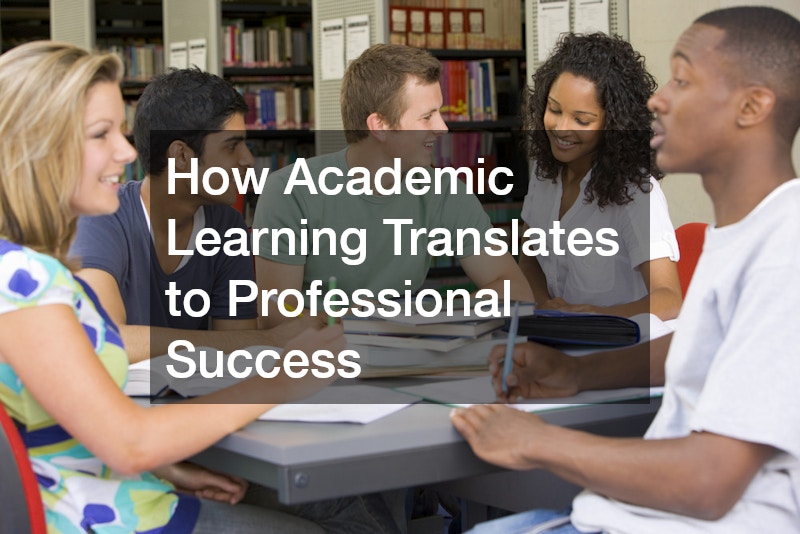
Academic learning is more than just memorizing facts or passing exams; it is the foundation upon which professional success is built. The knowledge, critical thinking skills, and problem-solving abilities developed through formal education equip individuals to navigate complex challenges in their chosen careers. From understanding intricate legal frameworks to mastering technical trades, academic preparation provides the tools necessary to excel in a professional setting. Whether someone is pursuing a career in law, healthcare, finance, or technology, the lessons learned in the classroom translate directly into practical skills that can enhance performance, efficiency, and client satisfaction.
In today’s competitive job market, professionals must demonstrate both theoretical understanding and practical competence. Academic learning introduces students to essential concepts, industry standards, and ethical considerations that form the backbone of their careers. For example, law students study statutes, case law, and procedural rules that allow them to effectively represent clients in various legal contexts. Similarly, aspiring electricians study electrical theory and safety regulations to ensure precise and safe execution on the job. Even careers that appear less technical, such as counseling or personal banking, rely on foundational academic knowledge to guide decision-making, manage risk, and build trust with clients.
Furthermore, academic learning cultivates soft skills that are critical to professional success. Communication, critical thinking, collaboration, and adaptability are all developed through classroom discussions, projects, and presentations. These competencies help professionals navigate real-world scenarios, from negotiating complex contracts to advising clients on sensitive matters. A divorce attorney, for instance, must combine legal knowledge with empathy and negotiation skills to achieve the best outcomes for their clients. Likewise, a cybersecurity professional leverages both technical expertise and strategic thinking to protect sensitive data and prevent cyber threats.
The impact of academic learning extends beyond knowledge acquisition. It instills a mindset of lifelong learning and continuous improvement, encouraging professionals to stay updated with industry trends and innovations. Plastic surgeons refine their techniques through ongoing study and practice, while realtors adapt to evolving market dynamics to meet client needs effectively. By connecting theoretical knowledge with practical application, education lays the groundwork for career advancement, professional recognition, and meaningful contributions within any field.
In essence, academic learning is the bridge between potential and achievement. It equips individuals with the insights, skills, and confidence to tackle professional challenges and deliver value in their careers. The following sections explore how academic learning translates into real-world success across ten diverse professions, highlighting the ways education shapes both general competency and specialized expertise.
Master Criminal Law
Academic learning in law programs provides aspiring criminal lawyers with a solid understanding of legal systems, courtroom procedures, and ethical standards. It equips them with critical thinking skills, research abilities, and knowledge of legal principles necessary to analyze complex cases and construct compelling arguments. Beyond memorizing statutes, law students learn to evaluate evidence, anticipate opposing strategies, and communicate persuasively, laying the foundation for professional effectiveness. Academic courses also teach practical skills like drafting legal documents, presenting cases, and negotiating settlements, which are essential for a successful career in criminal law.
For a criminal lawyer, classroom knowledge directly impacts courtroom performance and client outcomes. Studying past cases and legal precedents allows lawyers to develop strategies that anticipate challenges and leverage legal loopholes. By learning evidence evaluation and procedural requirements in school, a criminal lawyer can effectively represent clients in high-stakes situations, whether defending against criminal charges or navigating plea negotiations. Practical exercises such as mock trials help students gain confidence and adaptability, ensuring that when they transition to the professional world, they are prepared to meet the demands of the courtroom with skill and professionalism.
Navigate Divorce Cases

Education in family law teaches future divorce attorneys the complexities of marital law, child custody arrangements, and asset division. Academic courses provide a framework for understanding legal rights, ethical considerations, and negotiation techniques. Beyond legal knowledge, students develop interpersonal skills and emotional intelligence, which are essential when handling sensitive cases involving families. Academic learning also emphasizes conflict resolution, mediation, and communication strategies, preparing attorneys to guide clients through challenging legal processes with care and professionalism.
In practice, a divorce attorney relies on both academic and practical training to achieve favorable outcomes for clients. Lessons on property division, spousal support, and custody arrangements inform every decision, while negotiation techniques allow attorneys to navigate emotionally charged discussions effectively. By applying classroom principles in real-world scenarios, a divorce attorney can advise clients accurately, anticipate legal obstacles, and craft solutions that balance legal requirements with clients’ personal needs. Academic learning, therefore, transforms theoretical understanding into actionable skills that directly impact clients’ lives during complex transitions.
Decode Tax Rules
Academic preparation for tax attorneys emphasizes a detailed understanding of federal and state tax codes, regulatory compliance, and financial law. Students develop analytical skills to interpret complex legislation and evaluate its implications for individuals and businesses. Coursework in accounting, corporate finance, and tax planning provides a foundation for advising clients on legal tax strategies and avoiding penalties. Academic learning also nurtures problem-solving abilities, ensuring that tax attorneys can navigate evolving legislation and financial regulations efficiently.
When applied professionally, a tax attorney uses academic knowledge to help clients minimise tax liabilities and ensure compliance with legal requirements. Studying tax law and reviewing case studies allows attorneys to interpret complicated statutes, identify deductions, and develop effective planning strategies for individuals and corporations. A deep understanding of legislative nuances ensures that tax attorneys can provide precise guidance while mitigating financial risk. Academic learning, in this sense, transforms abstract concepts into actionable insights that have tangible financial benefits for clients.
Apply Electrical Skills

Technical education equips electricians with a comprehensive understanding of electrical theory, circuitry, and safety protocols. Classroom learning emphasizes principles of current, voltage, and resistance, while also introducing students to national electrical codes and practical troubleshooting methods. Academic training often combines theory with hands-on labs, helping students connect conceptual knowledge with real-world application. This dual approach ensures that electricians understand not only how electrical systems function but also how to maintain, repair, and install them safely and efficiently.
In professional practice, an electrician applies these skills to complex projects ranging from residential wiring to commercial installations. By understanding load calculations, circuit design, and safety requirements, electricians can prevent hazards and ensure code compliance. Academic training in problem-solving and critical analysis allows electricians to diagnose issues quickly, implement solutions accurately, and adapt to new technologies, such as smart home systems or renewable energy integrations. The knowledge gained through formal education directly translates into safe, effective, and reliable performance on the job.
Guide Counseling Clients
Academic programs in psychology, social work, or counseling provide the foundational knowledge necessary to understand human behavior, emotional development, and mental health challenges. Students learn evidence-based therapeutic techniques, ethical guidelines, and communication strategies essential for effective client support. Coursework often emphasizes empathy, cultural competence, and interpersonal skills, preparing students to navigate complex emotional situations professionally. Academic learning instills both theoretical understanding and practical approaches for helping clients achieve personal growth and emotional well-being.
In professional counseling services, these academic principles are applied to guide individuals through life challenges, stress management, and personal development. Counselors use techniques learned in school, such as cognitive-behavioral therapy or active listening, to assess client needs, develop treatment plans, and provide tailored guidance. By integrating classroom knowledge with real-world experience, counselors can build trust, foster resilience, and facilitate meaningful change in clients’ lives. Education transforms theoretical frameworks into actionable strategies that improve mental health outcomes.
Manage Banking Services

Education in finance, economics, and business administration provides personal bankers with a deep understanding of financial products, investment principles, and regulatory compliance. Academic learning emphasizes analytical skills, decision-making, and ethical practices required to manage clients’ financial needs responsibly. Coursework often includes topics such as credit evaluation, risk management, and customer relationship management, which collectively prepare students for effective banking service delivery. Academic training also cultivates problem-solving skills essential for navigating dynamic financial markets and client-specific scenarios.
In practice, professionals providing personal banking services rely on academic preparation to guide clients in managing accounts, investments, and loans. Knowledge of interest rates, financial regulations, and investment strategies allows bankers to offer informed recommendations tailored to individual goals. Classroom exercises in financial planning and case analysis translate directly into the ability to handle real-world banking challenges efficiently and accurately. Academic learning, therefore, ensures that personal banking professionals deliver value, mitigate risks, and build long-term client trust.
Protect Digital Data
Academic programs in cybersecurity focus on computer networks, data protection, and information security principles. Students learn to identify vulnerabilities, prevent cyberattacks, and implement security protocols to safeguard digital assets. Coursework often includes ethical hacking, cryptography, and risk assessment, providing a strong theoretical foundation for protecting sensitive information. Academic learning also emphasizes analytical thinking, problem-solving, and staying current with emerging threats, all of which are crucial in an ever-evolving digital landscape.
In the field of cybersecurity, professionals apply these academic lessons to protect organizations from data breaches and cybercrime. By understanding potential attack vectors, encryption techniques, and network monitoring, cybersecurity specialists can design and implement strategies to maintain system integrity. Practical skills gained from simulations, labs, and case studies prepare professionals to respond rapidly to incidents, ensuring the safety of digital information. Academic learning bridges the gap between theoretical knowledge and the practical demands of securing technology in real time.
Perform Plastic Surgery

Medical education provides aspiring plastic surgeons with a detailed understanding of human anatomy, surgical techniques, and patient care standards. Academic programs cover the principles of reconstructive and cosmetic surgery, ethical considerations, and risk management. Students gain foundational knowledge in biology, physiology, and clinical practices, which form the basis for safe and effective surgical interventions. Academic learning also cultivates precision, attention to detail, and problem-solving skills essential for complex procedures.
In professional practice, a plastic surgeon applies these academic lessons to perform procedures with accuracy and care. Knowledge of tissue structure, surgical instruments, and patient-specific factors allows surgeons to achieve desired outcomes while minimizing risks. Training in simulation labs, mentorships, and clinical rotations ensures that surgeons can translate theoretical understanding into hands-on expertise. Academic learning equips plastic surgeons with the skills and confidence necessary to deliver safe, high-quality patient care.
Advise Aviation Clients
Education in aviation management, aeronautical engineering, or related fields equips professionals with knowledge of aircraft operations, safety protocols, and regulatory compliance. Academic programs emphasize problem-solving, critical thinking, and industry-specific skills necessary for advising clients on aviation projects, fleet management, or operational efficiency. Students gain insights into aviation technology, logistics, and planning, providing a strong foundation for consultancy work. Academic learning also encourages analytical evaluation and strategic decision-making, essential for client guidance in complex scenarios.
In practice, an aviation consultant leverages academic knowledge to help clients optimize operations, ensure safety, and navigate regulatory requirements. Understanding flight operations, maintenance protocols, and industry standards allows consultants to recommend solutions tailored to client needs. By combining classroom learning with real-world case analysis, aviation consultants can provide informed advice, improve operational efficiency, and support strategic growth initiatives. Academic preparation translates directly into professional expertise and client confidence.
Sell Real Estate
Academic programs in real estate, finance, and business fundamentals provide a foundation for understanding property markets, valuation techniques, and sales strategies. Students learn market analysis, client relationship management, and regulatory compliance, which are critical for success in the real estate industry. Education also emphasizes negotiation, marketing, and communication skills, ensuring professionals can connect with clients effectively. Academic learning fosters strategic thinking and adaptability, preparing realtors to navigate fluctuating markets with confidence.
For realtors, academic knowledge directly impacts their ability to serve clients and close transactions. Understanding property law, market trends, and financial instruments allows the best realtors to guide buyers and sellers through informed decisions. Case studies and practical exercises during education provide insights into negotiation tactics, marketing strategies, and customer engagement, translating classroom concepts into effective real-world practices. Academic learning equips realtors with the expertise to excel in a competitive industry and deliver successful outcomes for their clients.
Academic learning plays a pivotal role in shaping professional success across diverse careers. It equips individuals with both theoretical knowledge and practical skills necessary to thrive. From legal professions to technical trades, finance, healthcare, and technology, education provides the foundation for competence, confidence, and adaptability. Lessons learned in classrooms, laboratories, and simulations prepare professionals to face real-world challenges with skill, bridging the gap between potential and achievement.
For criminal lawyers, education provides an understanding of statutes, case law, and courtroom procedures, ensuring effective client representation. Divorce attorneys leverage training in family law, negotiation, and ethical decision-making to guide families through sensitive matters. Tax attorneys apply knowledge of financial regulations and tax codes to advise clients accurately and mitigate risks. Similarly, electricians rely on technical education to safely design, maintain, and repair electrical systems, turning theory into real-world application.
Counseling services benefit from academic learning in psychology and social work, equipping professionals to support clients’ mental and emotional well-being. Personal banking services benefit from financial education that helps bankers manage client assets, investments, and risk effectively. Cybersecurity professionals apply classroom knowledge of networks, encryption, and threat assessment to safeguard data. Plastic surgeons translate medical training into skilled procedures, ensuring patient safety and outcomes.
Aviation consultants rely on academic expertise to advise clients on operations, fleet management, and regulatory compliance. Realtors leverage education in market analysis, property law, and client engagement to navigate dynamic markets, connect with clients, and close transactions. In each case, academic learning transforms knowledge into practical skills, professional judgment, and career achievement.
Beyond technical knowledge, academic learning cultivates critical soft skills such as communication, problem-solving, adaptability, and ethical decision-making. These competencies help professionals navigate challenges, build trust with clients, and make informed choices. Education also fosters lifelong learning, encouraging continuous skill development and adaptability.
In conclusion, academic learning is the bridge between education and career success. It provides the foundation, tools, and mindset required to excel across diverse fields. By combining theoretical knowledge with practical application, individuals deliver results, make meaningful contributions, and achieve professional fulfillment. The careers of criminal lawyers, divorce attorneys, tax attorneys, electricians, counseling services professionals, personal bankers, cybersecurity experts, plastic surgeons, aviation consultants, and realtors all demonstrate how academic preparation translates into tangible professional success.
